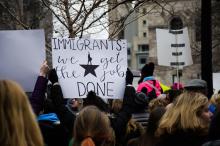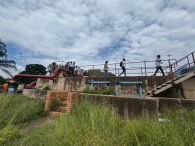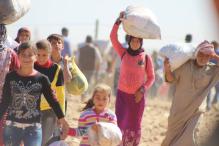About a billion people around the world live in slums, including roughly 30–50% of the urban population in the Global South (Lilford et al. 2017). In India, similar to other countries in the Global South, people often settle down in informal settlements upon their arrival in cites after having migrated from rural areas in search for seasonal work. Most of these migrant populations work in informal sectors and are left out of the healthcare and social safeguarding systems. Further, stigma, forced evacuations and structural mistreatment cause mistrust for the government (Ayeb-Karlsson et al. 2016, 2020). In India, the media already reported the first case of COVID-19 in a slum with 23,000 people in less than a square kilometre in Mumbai in March last year. Imaginably, WHO’s COVID-19 guidelines of two metres physical distancing and 20 seconds of hand washing with soap was almost impossible (Kluge et al. 2020).
The aim of this research is to qualitatively investigate the impact of COVID-19 upon migrants’ wellbeing and mental health in India. Migrants (mainly seasonal and temporary) in India who form a crucial part of the national informal labour forces were severely affected due to the sudden lockdown. Many ended up homeless as they were evicted out of accommodation provided to them by their employing industries. As transportation services shut down, they were forced to walk for weeks and months to get home. The roadblocks ended up trapping them in between states forcing them to seeking shelter and food in overcrowded public squares. In this context and with great ethical caution, we (1) investigate how the overall COVID-19 response in India impacted the mental health and wellbeing of migrant labours; (2) Examine how shocks to migrant livelihoods impacted their wellbeing; (3) Propose policy and practice recommendations that can strengthen existing health systems and better support pandemic responses in the future.
The Indian context and events represent an important case study to better understand the changes and shocks triggered by the pandemic upon societies in the Global South. The Indian Government was globally criticized for the way they responded to the pandemic, for their lack of social protection of their most vulnerable populations and for violating human rights. It will be crucial to rapidly and critically evaluate the immediate and longer-term impacts upon migrants with a specific focus on mental health, wellbeing and livelihoods. This will help draw out what support is required to address livelihood and mental health concerns now as well as how local, national and international responses can be improved in the future (Watts et al. 2018, 2021).
Empirical evidence investigating the impacts upon migrants during the pandemic is still scarce. However, since the start of the COVID-19 crisis, publications focussing on in on migrants and displaced people include Kluge et al. (2020), Liem et al. (2020), IOM (2020) and Sirkeci and Yucesahin (2020). The research consortium had the advantage of having extended expertise of working with people on the move worldwide. In this way, we were able to conceptually and empirically draw attention to the risks that mobile populations would face, in Raju and Ayeb-Karlsson (2020), as restrictions and lockdown measures were imposed. We believe that lessons learned from previous research investigating the relationships between disasters, social inequalities and how health determinants may exacerbate vulnerability will be key to overcoming the COVID-19 pandemic (Quinn and Kumar 2014; Hopman and Allegranzi 2020).
There are various reasons why mobile and/or trapped populations are particularly vulnerable in the face of the COVID-19 pandemic (Ayeb-Karlsson et al. 2018, 2019; Watts et al. 2021; Raju et al. 2021). For example, poor living conditions (overcrowded settlements, lack of water, shared sanitary facilities) make social distancing and other protection measures difficult to achieve. Migrants often work in precarious conditions, without unemployment benefits, social protection schemes or savings. Lockdowns and restrictions left many without an income as informal labour could not be carried out at home. Migrants, particularly undocumented, have limited access to healthcare services. People on the move tend to have underlying vulnerabilities, including anxiety and post-traumatic stress, related to their experiences pre-, during or post-migration. Adding to this, the pandemic aggravated an already hostile environment for migrants. Displaced people were often accused of spreading the virus and in India, and returning migrants were sprayed with toxic disinfectant liquids in a belief that it would prevent the spread. Migrants may have weaker support networks as they are disconnected from family members. Moving populations face the risk of being trapped, arrested or infected as road blocks and regulations restricted their movements.
We choose India as a case study country because of its context, its populations size and migrant flows that will give us key insights into the impacts of the coronavirus pandemic in the Global South. We specifically focus on the South Indian state Kerala which has had mixed responses (positive and negative) overall during the pandemic. India is a country that has been particularly affected by the pandemic due to the spread of the virus (including concerns regarding underreporting), the major social disparities, its extensive informal economy, lack of social security and overburdened health systems (Patralekha 2020; Cousins 2020a, 2020b). We also know from our research in slums and informal settlements that the living and working conditions here severely impacted the wellbeing of migrants before the pandemic. The additional shock of COVID-19 is reported to have made the situation worse.
The sudden lockdown in India left millions of daily wage labourers stranded on their way home or stuck in slums without income or food. People trapped en route home had to gather streets and squares in large crowds while awaiting government supplied meals. ‘I will die of hunger long before the virus gets me’ they responded when media asked if they were coping (NDTV, 14 April 2020). The COVID-19 death rates may have been quantified, but those losing their lives due to hunger, road accidents and exhaustion while walking the long way home were not registered. It is crucial to follow up and ensure that people’s experiences are documented, not forgotten and that we learn from these lessons. The pandemic has adversely impacted the goals of migrants (improvement of livelihoods and living conditions) as many of them were left without work. These life experiences also resulted in loss of hope for the future as many migrant workers promised to never return to the cities. The impacts of the pandemic such as the loss and damage to livelihoods will be studied using the Sustainable Livelihoods Framework (DFID, 1999; Ayeb-Karlsson et al., 2016). PROWELLMIGRANTS specifically focuses on how shocks to larger structures and societal systems have adversely impacted livelihood outcomes. Our programme will uniquely investigate the mental health and livelihood nexus. This research is important from a wider societal perspective. Even though there is a growing body of clinical research investigating the medical impacts of COVID-19, its influence upon migrants has received little attention. Social science investigations that go beyond statistics and study the lived experience of migrants during COVID-19 are lacking.
There are several important structural social inequality aspects to this study (gender, caste, class, age). Before the pandemic, India accounted for one in three child marriages globally, but had become a world leader in working to reduce child marriage. The lockdown, however, left millions of daily labourers and migrant workers without work, and pushed millions more into poverty. India's economy contracted by almost 24% last quarter and schools remain closed across the country as the COVID-19 cases grew. Millions of families felt forced to consider child marriage to alleviate poverty. Adding to this, as in other countries, India observed a peak in domestic abuse and gender-based violence with the lockdown. The global skyrocketing of gender-based violence has been described as ‘a pandemic within the pandemic’ (Cousins 2020a, 2020b). These gendered and social risks are important wellbeing aspects in this study. PROWELLMIGRANTS will focus on the impacts of the pandemic upon particularly vulnerable groups (such as women and children) among the already marginalised migrant populations.
RESEARCH CONSORTIUM:
The research consortium has the advantage of having studied the situation of migrants in India since the start of the pandemic. Several publications on the topic have already been published and submitted for publication. Adding to this, Principal Investigator Dr Ayeb-Karlsson (UNU-EHS) has extensively researched the wellbeing of migrants and displaced populations in various contexts including India, and Co-Investigator Dr Raju (University of Copenhagen) and Co-Investigator Dr Martin (University of Sussex) are not only from India but have dedicated their research portfolios to investigating disaster preparedness, migration and the burden of disease, responses and opportunities in the country. The scholars already have a well-established working relationship stretching over almost a decade of time. The intention is for this pilot study to be scaled up after completion to include three case studies spread out over three continents (Africa, Asia and South America).
Principal Investigator Dr Ayeb-Karlsson has dedicated an extensive amount of time to fine-tune her methodological storytelling approach that is planned for this research (Ayeb-Karlsson 2020 and 2021). The approach has previously been conducted in Bangladesh, Senegal, South Africa and the Philippines. The value of storytelling sessions relates to the richness of its data as well as the therapeutic and healing elements of sharing life stories and personal experiences. It is important, both for people to process and share their experiences, as well as for the data quality that the study is carried out as soon as possible. This will be feasible as Co-Investigator Dr Martin is permanently based in Kerala, India.
RESEARCH TEAM:
The research team includes PI Ayeb-Karlsson, and Co-Is Dr Raju and Dr Martins as well as an additional four core team members. Two of the research team members, Research Associate Dr Johns and Research Assistant Ms Mathews, are based in Kerala. At UNU-EHS, the research team is supported by Research Assistants Ms Sheaffer and Ms Harasym. Besides the core team, the research consortium will draw from the knowledge of additional migration section members and other institute scholars at UNU-EHS.
RESEARCH SETTING AND PARTICIPANTS:
The state of Kerala has been praised for its rapid response and immediate interventions during the initial phases of the pandemic. The Kerala Health Minister was applauded worldwide for her response efforts. Kerala has a long migration history linked to the Gulf countries. However, new migration trends have turned the region into diverse migration-hub which makes it a particularly interesting case study location.
Kerala has (1) incoming Indian internal migrants (often undocumented from the North who engage in the fishing industry); (2) incoming international (often undocumented) migrants mainly from Bangladesh and African countries; (3) outgoing (now returned) Indian migrants who ended up trapped across the country during the lockdown; and (4) outgoing (now returned) international Indian migrants who when COVID-19 struck mainly tended to domestic- or construction work, and undocumented fishing in the Gulf countries. Conceptually, all four categories will be examined using the lens of the Sustainable Livelihood Framework (DFID, 1999; Ayeb-Karlsson et al., 2016). This helps us capture the lived experiences of migrants and assess how the pandemic impacted their livelihoods and wellbeing.
WORKPLAN:
The field research will involve approximately 50 individual migrant interviews (balanced among the migration groups while ensuring gender diversity), 24 collective storytelling sessions or focus group discussions (one female and male session per study site), and approximately 10 key informant interviews with health and social workers, non-governmental organisations, and government officials.
The storytelling sessions will be guided by a topic list that encourage interactive life experience narration. The personal storylines will guide the sessions while ensuring that the sessions tap into how the pandemic impacted people’s livelihood sustainability and wellbeing. NVivo, thematic narrative and textual discourse analysis will be used to process the data. The overarching themes will serve as the guide for analysis (Flyvbjerg, 2006).
REFERENCES: Ayeb-Karlsson, S. (2021). ‘When we were children we had dreams, then we came to Dhaka to survive’: Urban stories connecting loss of wellbeing, displacement and (im)mobility. Climate and Development. Ayeb-Karlsson, S. (2020). ‘I do not like her going to the shelter’: Stories on gendered disaster (im)mobility and wellbeing loss in coastal Bangladesh. International Journal of Disaster Risk Reduction.
Ayeb-Karlsson, S., Kniveton, D. and Cannon, T. (2020). Trapped in the prison of the mind: notions of climate-induced (im)mobility decision-making and wellbeing from an urban informal settlement in Bangladesh. Palgrave Communications. 6(62), pp.1-15. ISSN 2055-1045.
Ayeb-Karlsson, S., Kniveton, D., Cannon, T., van der Geest, K., Ahmed, I., Derrington, E. M., Florano, E. and Opondo, D.O. (2019). I will not go, I cannot go: Cultural and social constraints to disaster preparedness in Asia, Africa and Oceania. Disasters 43, 752-770.
Ayeb-Karlsson, S., Smith, C. D. and Kniveton, D. (2018). A discursive review of the textual use of ‘trapped’ in environmental migration studies: The conceptual birth and troubled teenage years of Trapped Populations. Ambio. ISSN 0044-7447.
Ayeb-Karlsson, S., Van der Geest, K., Ahmed, I., Huq, S., and Warner, K. (2016). A people‐centred perspective on climate change, environmental stress, and livelihood resilience in Bangladesh. Sustainability Science, 11(4), 1-16.
Cousins, S. (2020a). 2·5 million more child marriages due to COVID-19 pandemic. The Lancet, 396(10257), 1059.
Cousins, S. (2020b). COVID-19 has “devastating” effect on women and girls. The Lancet, 396(10247), 301-302.
DFID (1999). Sustainable Livelihoods and Poverty Elimination. Department for International Development, London.
Flyvbjerg B. (2006). Five misunderstandings about case-study research. Qual Inq; 12, 219–245.
Hopman J, Allegranzi B (2020) Managing COVID-19 in low- and middle-income countries. JAMA.
IOM (2020). COVID-19: A new challenge for migration policy. Migration Policy Practise. IOM, Berlin.
Kluge HHP, Jakab Z, Bartovic J et al (2020). Comment refugee and migrant health in the COVID-19 response. The Lancet, 395(10232), 1237-1239.
Liem, A., Wang, C., Wariyanti, Y., Latkin, CA., and Hall BJ (2020). The neglected health of international migrant workers in the COVID-19 epidemic. The Lancet Psychiatry, 7(4), e20.
Lilford RJ, Oyebode O, Satterthwaite D et al (2017). Improving the health and welfare of people who live in slums. The Lancet 389(10068), 559–570.
Patralekha, C. (2020). Is India missing COVID-19 deaths? The Lancet, 396(10252), 657.
Quinn SC, Kumar S (2014) Health inequalities and infectious disease epidemics: a challenge for global health security. Biosecur Bioterror 12, 263–273.
Raju, E. and Ayeb-Karlsson, S. (2020). COVID-19: how do you self-isolate in a refugee camp? International Journal of Public Health. ISSN 1661-8556.
Raju, E. and Van Niekerk, D. (2020). Why do the impacts of coronavirus disease 2019 and the response surprise the world? Jàmbá: Journal of Disaster Risk Studies 12(1): a1028.
Raju, E., Dutta, A. and Ayeb-Karlsson, S. (2021). Covid-19 in India: Who are we leaving behind? Progress in Disaster Science.
Schmid B., Raju E. (2020). Humanitarian Crisis and Complex Emergencies – Burden of Disease, Response, and Opportunities for Global Health. In: Haring R., Kickbusch I., Ganten D., Moeti M. (eds) Handbook of Global Health. Springer, Cham.
Sirkeci, I., and Yucesahin, M. M. (2020). Coronavirus and Migration: Analysis of Human Mobility and the Spread of Covid-19. Migration Letters, 17(2), 379–398.
Watts, N., Amann, M., Arnell, N., Ayeb-Karlsson, S., Beagley, J., Belesova, K., ... & Capstick, S. (2021). The 2020 report of The Lancet Countdown on health and climate change: responding to converging crises. The Lancet.
Watts, N., Amann, M., Ayeb-Karlsson, S. … and Costello, A. (2018). The Lancet Countdown on health and climate change: from 25 years of inaction to a global transformation for public health. The Lancet, 391 (10120). pp. 581-630. ISSN 0140-6736
- Project Manager
- Dr. Kees van der Geest



